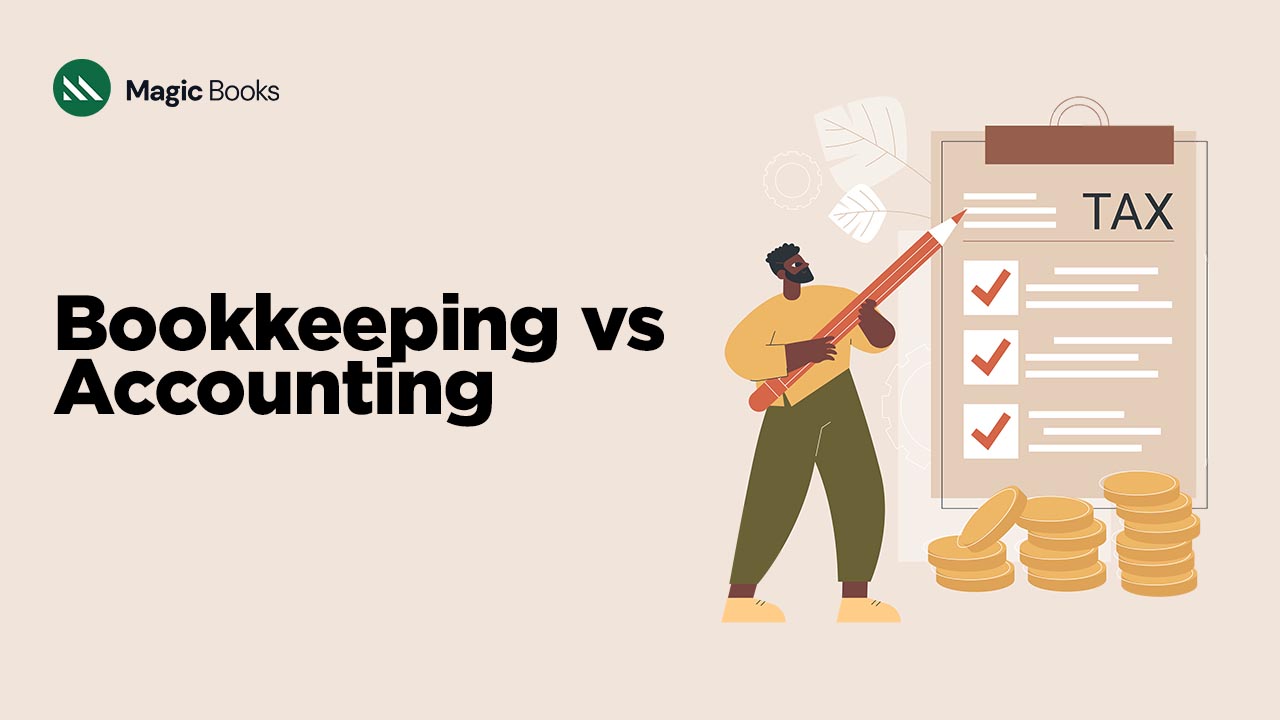Newcomers in the industry often confuse the terms “bookkeeper” and “accountant,”. There are differences between them that are important to grasp. Even though both roles have objectives in finance management they serve purposes at various stages of the accounting process. It is vital to discern these variances to ensure you make a decision that best suits your business needs.
What is Bookkeeping?
Bookkeeping is the systematic process of recording, organizing and tracking all financial transactions such as sales, expenses, invoices and payments between businesses. It helps maintain accurate financial records, ensuring compliance and supporting tax filings.
Bookkeeping comprises of :
- Record financial transactions.
- Posting debits and credits.
- Preparation of financial statements such as balance sheets, cash flow statements and income statements.
- Producing invoices
- Maintaining and balancing subsidiaries, general ledgers and past accounts
- Completing payroll.
Speaking of general ledgers, it is one of the main components of bookkeeping. But, what is a general ledger?
It is a basic document where the bookkeeper documents the amounts from sales and expenses receipts. The more sales are closed, the more ledger is posted. Ledger doesn’t need to be a physical document (What is this, the 70s?) it can be a specialized software or a google sheet (We hope you don’t choose this).
The documentation part might look simple but trust us, it’s not. The bookkeeping complexity purely depends upon the size of the business and the number of transactions completed daily, weekly, and monthly. Sometimes certain sales and deals and purchases need to be recorded in a ledger with certain supporting documents.
Lucky for you, The IRS has laid out which business transactions require supporting documents.
The transactions that you recorded in your bookkeeping are also the foundation of accounting.
Now let’s jump to the next step!
What is Accounting?
Accounting is a field that requires individuals to provide a comprehensive overview of your company’s financial status. Accountants use statements prepared by bookkeepers as a foundation for their analysis while also examining patterns and the flow of funds within the organization.
Accounting comprises of:
- Preparing adjusting entries (recording expenses that have occurred but aren’t yet recorded in the bookkeeping process)
- Analyzing costs of operations.
- Completing income tax returns.
- Aiding the business owner in understanding the impact of their financial decisions.
- Reviewing company financial statements.
The most important part of the accounting process is to analyze financial reports to help stakeholders make better business decisions. The results from those reports helps in understanding actual profitability and an awareness of cash flow in the business.
Accounting actually turns all the data from the general ledger into insights that shows a bigger picture of business’ finance. Usually stakeholders go to accountants for help with tax planning. analyzing their financial position and forecasting.
Difference between Bookkeeping and Accounting:
| Aspect | Bookkeeping | Accounting |
| Definition | Bookkeeping is the process of recording financial transactions systematically | Accounting has a broader practice where it involves analyzing, interpreting and summarizing financial information from the bookkeeping records. |
| Scope | The data entry process is usually limited as it only involves documentation of transactions | The process usually encompasses auditing, forecasting and financial strategy |
| Purpose | To maintain a detailed record of all business transactions. | To provide insights into a company’s financial health, aid the stakeholders in crucial decision making and financial forecasting for future business plans. |
| Skill Level | Typically requires fewer skills and is often performed by clerks or entry level staffs | Requires expertise in financial analysis, accounting principles, latest financial regulations. Usually a certified accountant is prepared. |
| Role in Financial Cycle | Serves as the first step in the accounting process, which includes recording raw financial data. | Steps in after the first step, which includes interpreting data provided by bookkeeping to create reports and make forecasts. |
| Tools Used | Primarily uses bookkeeping software, ledgers, journals and spreadsheets. | Usually uses accounting software, such as ERP systems, financial modeling tools, and complex accounting frameworks |
| Financial Statements | Do not typically require preparing financial statements, but they will assist with raw financial data. | Hugely responsible for preparing financial statements such as balance sheets, income statements and cash flow statements |
| Accuracy Requirement | Highly important to be precise because inaccuracies can affect all downstream of the financial process. | Relies heavily on accuracy of bookkeeping data but also involves in estimation and judgment for valuation and forecasting |
| Decision Making | Does not participate in decision making. Purely focuses on documentation only. | Plays a huge role in decision making by providing financial insights and future projections. |
| Regulatory Compliance | Limited involvement in compliance but the records must meet basic standards. | Highly involved in compliance, ensuring all financial records meet regulatory and tax requirements. |
| Reporting | Provides basic financial reports and transactional summaries for accounting. | Prepares detailed reports like income statements and cash flow analyses for stakeholders. |
| Frequency of Work | Daily recording of transactions is essential to keep up to date records | Typically involves monthly, quarterly and annual analysis reporting and planning |
| Audit Support | Bookkeeping records are audited by accountants to verify accuracy | Accountants conduct audits and evaluate the accuracy of financial records which can involve reviewing bookkeeping entries. |
Do you want us to dig deeper? We thought you would never ask!
Which one do I need for my business?
If you are a stakeholder who is reading this blog to understand who to hire for your financial work, this section is for you!
Let’s dive in:
Whether your business is large or small, you need to have an understanding of you accounting needs. It’s really important to know which role suits the needs of your company.
So the million dollar question is do you need a bookkeeper or an accountant?
You will need a bookkeeper when you need help with fundamentals of financial management. This is only when you find yourself spending too much time managing daily entries and basic financial tasks. Here is where a bookkeeper can help you manage those daily entries and give you some break.
Bookkeepers are the most valuable asset if your business has straightforward transactions. They excel at maintaining day to day financial records, making them perfect for business with small budgets but urgent need for professional financial support.
You might need a bookkeeper if:
- You Want to record daily transactions
- You have small inventory and a less complex business structure
- You have less budget and want to pay less for the ledger workflow
As you see success in your business venture, you will get to see more revenue and that means your finance is going to get pretty complex. This is where accountants expertise becomes increasingly valuable. You will need them to not only provide more than just accurate bookkeeping, you will also need them to provide strategic financial planning and guide your business’s financial future. Accountants become superheroes during complex financial structures or when stakeholders need sophisticated tax planning. If your business needs detailed financial analysis, wanting to take bigger leaps in the future and require tax planning advice, accountants are the right people to reach out to!
So, Choose an accountant:
- To help you monitor and record complex transactions
- Have large inventories
- Have the ability to pay more
To understand the difference between an accountant and a bookkeeper, it’s helpful to know a little bit about the accounting cycle. It’s a series of tasks that every business follows to create accurate financial reports.
Here is a Quick Look at the core steps of this cycle:
Creating a chart of accounts:
First , there is the chart of accounts which is essentially a master list of all accounts in a company. It is divided into 4 categories: Assets, liabilities, income and expenses.
- Assets might include things like property or inventory.
- Liabilities cover what you owe such as loans or payroll taxes
- Income includes revenue streams like sales or rental income
- Expenses include salaries or advertising costs
A bookkeeper typically takes charge of setting up and maintaining this chart and record every financial transaction based on it
Keeping Journal Entries and the General ledger
Bookkeepers are responsible for logging all the transactions using receipts, invoices and other financial records. This ledger is the central hub for all the financial data. While bookkeepers usually handle these entries , accountants may step in to oversee or even complete these tasks if needed.
Generating the Trial Balance and Adjusting Entries
After all the transactions are logged, the accountant generates the trial balance. It is a summary of all accounts and their balances. Sometimes adjustments are necessary to comply with accounting standards, especially for businesses that use the accrual method as required by generally accepted accounting principles (GAAP). With an updated trial balance, accountants then prepare the final financial statements.
Note: This accounting cycle happens at the end of each month and year, to ensure that financial reports are current. If a business doesn’t have a bookkeeper or accountant, this whole responsibility falls to the owner.
Alright, so by now, you’ve got the basics of what sets bookkeepers and accountants apart. At a glance, bookkeeping is all about maintaining a daily, organized record of every transaction, like balancing a checkbook on a larger scale. Bookkeepers focus on accurate records and foundational reports—keeping your business’s financial train on the rails. They’re ideal for businesses with straightforward transactions that need day-to-day support without diving deep into complex financial strategy.
But as your business grows, those finances start to get more complicated. That’s where an accountant’s expertise comes into play. While bookkeepers document the history, accountants interpret that history to help you plan for the future. Accountants analyze the information bookkeepers organize and turn it into actionable insights, like tax planning or cash flow forecasting. They can also help you understand what the numbers mean for the bigger picture and make informed, strategic choices.
So, how do you know who to hire? If you’re mainly looking for help managing daily entries, or if you’re a small business with a simple financial structure, a skilled bookkeeper will keep things efficient and organized. But if your business is growing or facing more complex financial decisions—like needing tax guidance or insight into profitability—an accountant’s analytical skills will become essential.



